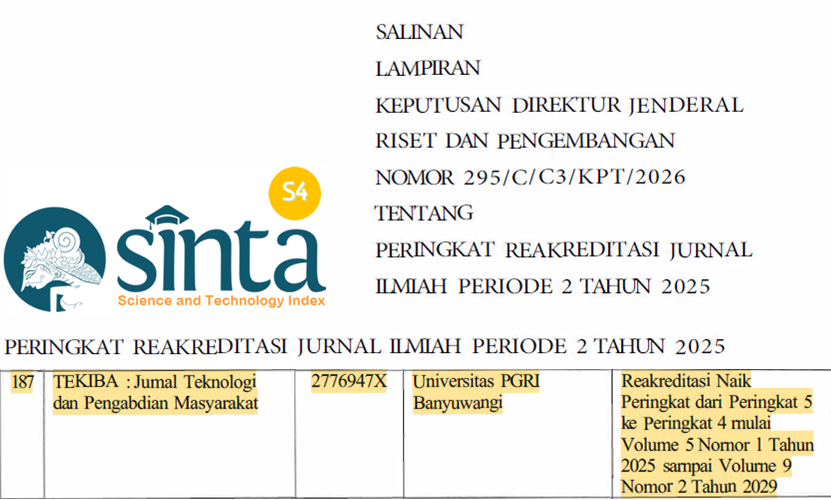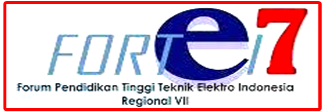Pengelolahan Sampah Di Kawasan Wisata Bukit Kebo Balikpapan Melalui Konsep Bank Sampah
DOI:
https://doi.org/10.36526/tekiba.v4i2.4438Keywords:
Waste Bank, Environment, Tourism, Bukit Kebo, Recycling WasteAbstract
The ecotourism environment must be kept clean and sustainable for the sake of sustainability and comfort of visitors. Bukit Kebo Tourism Area is one of the many ecotourism and edutourism destinations in Balikpapan City. With the increasing number of visitors (tourists) to Bukit Kebo, it has an impact on the increase in the volume of waste produced. The increase in the volume of waste has not been managed properly, because the waste is only piled up and burned. Where the impact of hoarding can provide the potential for environmental pollution and the results of burning waste also cause pollution. In overcoming these problems, a solution is offered by using the concept of a waste bank to manage waste, as well as providing assistance to partners about the importance of recycling waste. In addition, education is also carried out for visitors to increase awareness and attention about the importance of maintaining environmental cleanliness through the installation of appeal plaques and campaigns through the distribution of brochures. The results of the responses given by management partners and visitors show quite positive results regarding the impacts given from the results of activities to always maintain environmental sustainability and cleanliness, especially in tourist areas.
References
M. Rohman, M. Sulaiman, A. Fadliana, B. C. Tjiptady dan P. Choirina, “Upaya Pelestarian Lingkungan Melalui Penanaman Bibit Pohon Di Desa Palaan, Kabupaten Malang,” Jurnal Andalas: Rekayasa dan Penerapan Teknologi, vol. 1, no. 2, pp. 57-60, 2021.
Bisnis.com, “Ramai Kunjungan, Pengelola Bukit Kebo Imbau Masyarakat Agar Taat Aturan,” Kalimantan Bisnis, 9 2021. [Online]. Available: https://kalimantan.bisnis.com/read/20210809/407/1427811/ramai-kunjungan-pengelola-bukit-kebo-imbau-masyarakat-agar-taat-aturan. [Diakses 11 2024].
A. Fauzan, H. P. Putra dan Y. Yurian, “Analisis Timbulan Dan Komposisi Sampah Di Kawasan Wisata Taman Pintar Dan Sindu Kusuma Edupark D.I. Yogyakarta,” DSPACE Universitas Islam Indonesia , 2018.
L. Ningrum, S. Hendradewi dan N. Nurbaeti, “Healthy Rural Tourism with Good Management in Penglipuran Bali – Indonesia,” dalam IOP Conference Series: Earth and Environmental Science, 2018.
B. S. Kaloko, L. Wulandari, M. Z. R. Amin dan M. K. Anam, “Peningkatan Pengetahuan Masyarakat Desa Bungatan Kabupaten Situbondo Tentang Sanitasi Lingkungan,” TEKIBA : Jurnal Teknologi dan Pengabdian Masyarakat, vol. 3, no. 2, pp. 34-39, 2023.
I. Purwanti, “Konsep Dan Implementasi Ekonomi Sirkular Dalam Program Bank Sampah Studi Kasus: Keberlanjutan Bank Sampah Tanjung,” AmaNU: Jurnal Manajemen dan Ekonomi, vol. 4, no. 1, pp. 89-98, 2021.
A. Rosdiana dan P. A. Wibowo, “Program Pendampingan Daur Ulang Sampah Sebagai Upaya Pengurangan Polusi Lingkungan Melalui Transformasi untuk Nilai Tambah Ekonomi,” KUAT Keuangan Umum Dan Akuntansi Terapan, vol. 3, no. 2, p. 95–100, 2021.
W. Zhu dan D. Lu, “A Study on the Factors and Enhancement Strategies of Environmental Responsibility of Eco-Tourists,” dalam IOP Conference Series: Earth and Environmental Science, 2019.
R. Aziz, Y. Ruslinda, Y. Dewilda dan Mahmuda, “Characteristic of Tourim Solid Waste of Harau Valley, West Sumatra,” dalam IOP Conference Series: Materials Science and Engineering, 2020.
E. Gravitiani, N. R. Chayyani dan A. H. Juwita, “Cost and Benefits Analysis of Implementing Waste Bank in Gunung Kidul Beach Area, Yogyakarta,” dalam IOP Conference Series: Earth and Environmental Science, 2021.
Y. Ibrahim dan Y. Yusof, “Towards Sustainable Environmental Management through Green Tourism: Case study on Borneo Rainforest Lodge,” Asian Journal of Tourism Research, vol. 2, no. 3, 2017.
P. A. Rizki, Y. Yushardi dan S. Sudartik, “Daur Ulang Sampah Menjadi Barang Yang Bernilai Ekonomis Di Kalangan Masyarakat,” JURNAL SAINS RISET, vol. 13, no. 1, pp. 83-87, 2023.
A. S. Suryani, “Peran Bank Sampah Dalam Efektivitas Pengelolaan Sampah (Studi Kasus Bank Sampah Malang),” Aspirasi: Jurnal Masalah-Masalah Sosial, vol. 5, no. 1, p. 71–84, 2014.
W. Septiandari, S. Hidayatullah, S. Alvianna, A. Rachmadian dan D. H. Sutanto, “Pengaruh Citra Destinasi Wisata Dan Kualitas Layanan Terhadap Kepuasan Pengunjung Di Pantai Tiga Warna,” Competence: Journal of Management Studies, vol. 15, no. 2, pp. 134-148, 2021.
Tabroni, A. Bahits, I. S. Lesmana, Saepudin, P. Harsono dan Yuliah, “Upaya Peningkatan Kepedulian Kebersihan Pantai Melalui Manajemen Efektif Program Edukasi Lingkungan Di Pelabuhan Merak Kota Cilegon,” Indonesian Journal of Engagement, Community Services, Empowerment and Development, vol. 3, no. 3, pp. 326-335, 2023.
K. Khairunnisa, I. S. Jiwandono, N. Nurhasanah, N. K. Dewi, H. H. Saputra dan T. L. Wati, “Kampanye Kebersihan Lingkungan Melalui Program Kerja Bakti Membangun Desa Di Lombok Utara,” Jurnal Pendidikan Dan Pengabdian Masyarakat,, vol. 2, no. 2, pp. 230-234, 2019.
P. A. Y. Rantisari, K. A. P. Triyandani, I. W. D. Putra, I. G. A. D. Diputra dan N. G. A. A. M. Triwulandari, “Edukasi Dan Sosialisasi Pengolahan Sampah Anorganik Melalui Bank Sampah,” Jurnal Pengabdian Masyarakat Ilmu Keguruan dan Pendidikan, vol. 5, no. 1, pp. 42-47, 2022.
I. K. B. Sandika, K. K. Widiartha, I. G. I. Sudipa dan W. G. S. Parwita, “Pengelolaan Bank Sampah Sebagai Upaya Edukasi Masyarakat Pada Desa Kukuh, Kecamatan Kerambitan,” Jurnal Pengabdian Masyarakat Indonesia , vol. 1, no. 2, pp. 47-53, 2022.
E. R. Amien, D. D. Novita, M. Telaumbanua dan F. K. Wisnu, “Pengenalan Konsep 3r (Reduce, Reuse, Recycle) Dalam Peningkatan Kesadaran Lingkungan Di Sekolah Dasar Khoiru Ummah Kota Bandar Lampung,” Jurnal Pengabdian dan Pemberdayaan Masyarakat Inovatif, vol. 2, no. 1, pp. 7-12, 2023.
F.-C. Mihai, “Tourism Implications on Local Waste Management. Case Study: Neamț County Romania,” Present Environment and Sustainable Development, vol. 7, no. 1, pp. 214-221, 2015.
Downloads
Published
Issue
Section
License
Copyright (c) 2024 Mochamad Sulaiman, Christopher Davito Prabandewa Hertadi, Sigit Rahmat Rizalmi, Andaya Rizky Trisambada, Achmad Riyadi, Samara Putri Salman

This work is licensed under a Creative Commons Attribution-ShareAlike 4.0 International License.










